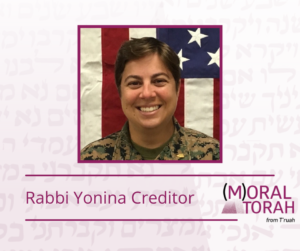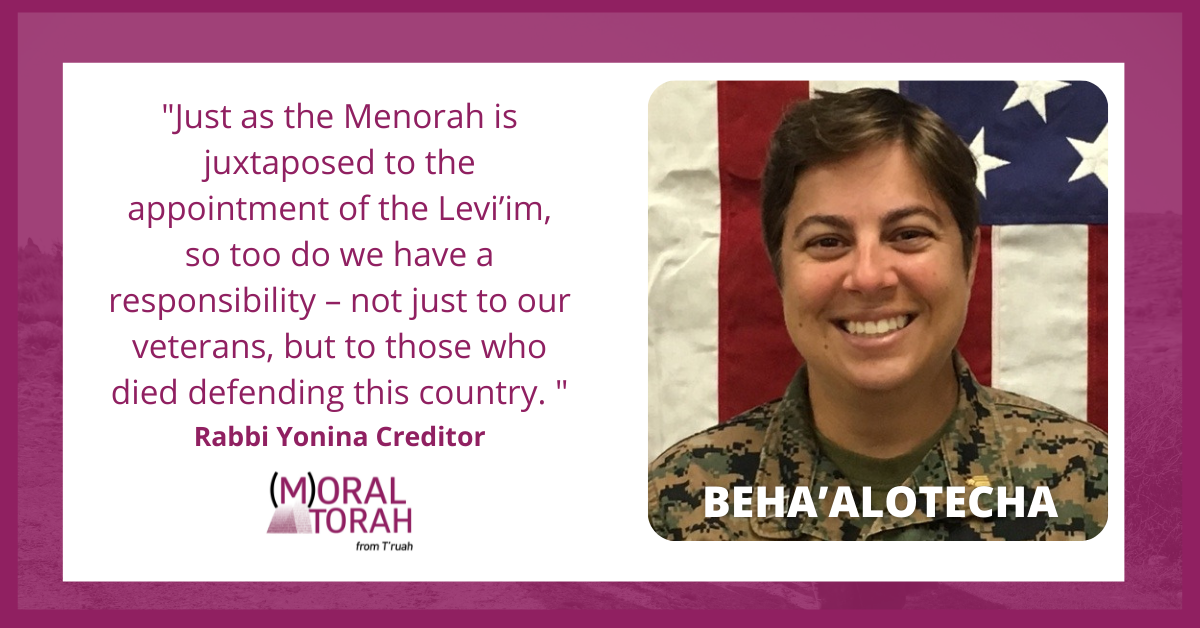A D’var Torah for Parshat Beha’alotecha by Rabbi Yonina Creditor
The rabbis teach that everything in Torah is placed in a specific order for a reason. The enumerated commandment to keep Shabbat is juxtaposed to the building of Mishkan (the portable Temple), to teach us that any act taken to build the Mishkan could not be done on Shabbat. This form of biblical exegesis is called “Smichut” (adjacent or juxtaposition), and because this parshah falls on Memorial Day, I am applying it to the beginning of Beha’alotecha.
Moses is commanded by God to build the Menorah, the candelabra, which is followed immediately by God’s command to anoint the Levi’im (Levite males) into the service of Aaron, his sons, and all the Kohanim. The Levi’im are instructed to shave all the hair off their bodies, wash, anoint, be presented to all of Israel, and bring an offering to God as the ritual to begin their service.
Sign up to receive (M)oral Torah in your inbox each week.
So, what is the significance of juxtaposing the Menorah and the commissioning of the Levi’im?
We know the Menorah is a source of light that chases away the darkness, as we see when lighting our own Chanukah candles. It illuminates that which is hidden, as we perform Bedikat Chametz, using a solitary candle to help us find the last crumbs of Chametz before Passover begins. The Shabbat candles enhance our Shabbat experience by lighting the space so we may eat, study, and enjoy each other’s company.
If the Menorah is a symbol of illumination, then putting the commissioning of the Levi’im adjacent to it is meant to teach us an important lesson on how we should view, and treat, those who serve – whether it be voluntary or involuntary. The Levi’im were responsible for ensuring the light of the Menorah would never go out; Ibn Ezra, the 12th century Spanish commentator, deduces from this that God would speak to Moses day or night (Numbers 8:2). The proximity of the Levi’im to the Holy One was an honor not bestowed upon many, which the Israelites understood.
The parallelisms are not lost on me this Memorial Day weekend.
When U.S. military recruits enter boot camp, they experience the same thing as the Levi’im. Males get their heads shaved, everyone washes, and all are given new uniforms to wear; they raise their right hands and swear to support and defend the Constitution of the United States, and to obey the orders of those appointed over them. A public ceremony is held, where they officially take their positions in the Armed Forces, and their names become Soldier, Marine, Sailor, Airman, Coastguardsman, or Officer. Their voluntary service is their sacrificial offering.
Just as the Menorah is juxtaposed to the appointment of the Levi’im, so too do we have a responsibility – not just to our veterans, but to those who died defending this country.
Find more commentaries on Parshat Beha’alotecha.
So many people use Memorial Day weekend as a chance to go to the beach, get a day off from work, or just sleep in. We are able to do those things because of the sacrifices made by those who brought the light and chased away the darkness during world conflicts.
We should dedicate ourselves to making the world a place where no one needs to serve, and no service member ever needs to pay the ultimate sacrifice ever again.
 As we work to bring that world into fruition, we must acknowledge the debt that we owe those who gave their lives while in uniform. We must make our gratitude visible, whether attending a local memorial service, visiting war memorials, or simply telling stories of heroism and sacrifices that were made by service members on land, in the air, and at sea. By doing these acts of remembrance, we send the message to those serving now that should they make the ultimate sacrifice, God forbid, they will not be forgotten.
As we work to bring that world into fruition, we must acknowledge the debt that we owe those who gave their lives while in uniform. We must make our gratitude visible, whether attending a local memorial service, visiting war memorials, or simply telling stories of heroism and sacrifices that were made by service members on land, in the air, and at sea. By doing these acts of remembrance, we send the message to those serving now that should they make the ultimate sacrifice, God forbid, they will not be forgotten.
Rabbi Yonina Creditor is in her eighth year on active duty as a United States Navy chaplain. She is the only member of her family to serve in the military without being drafted.

